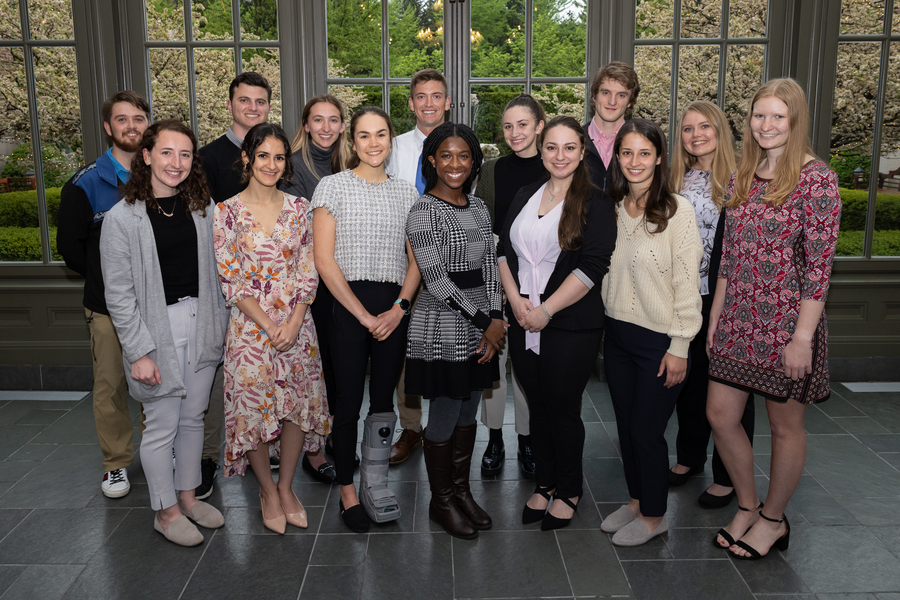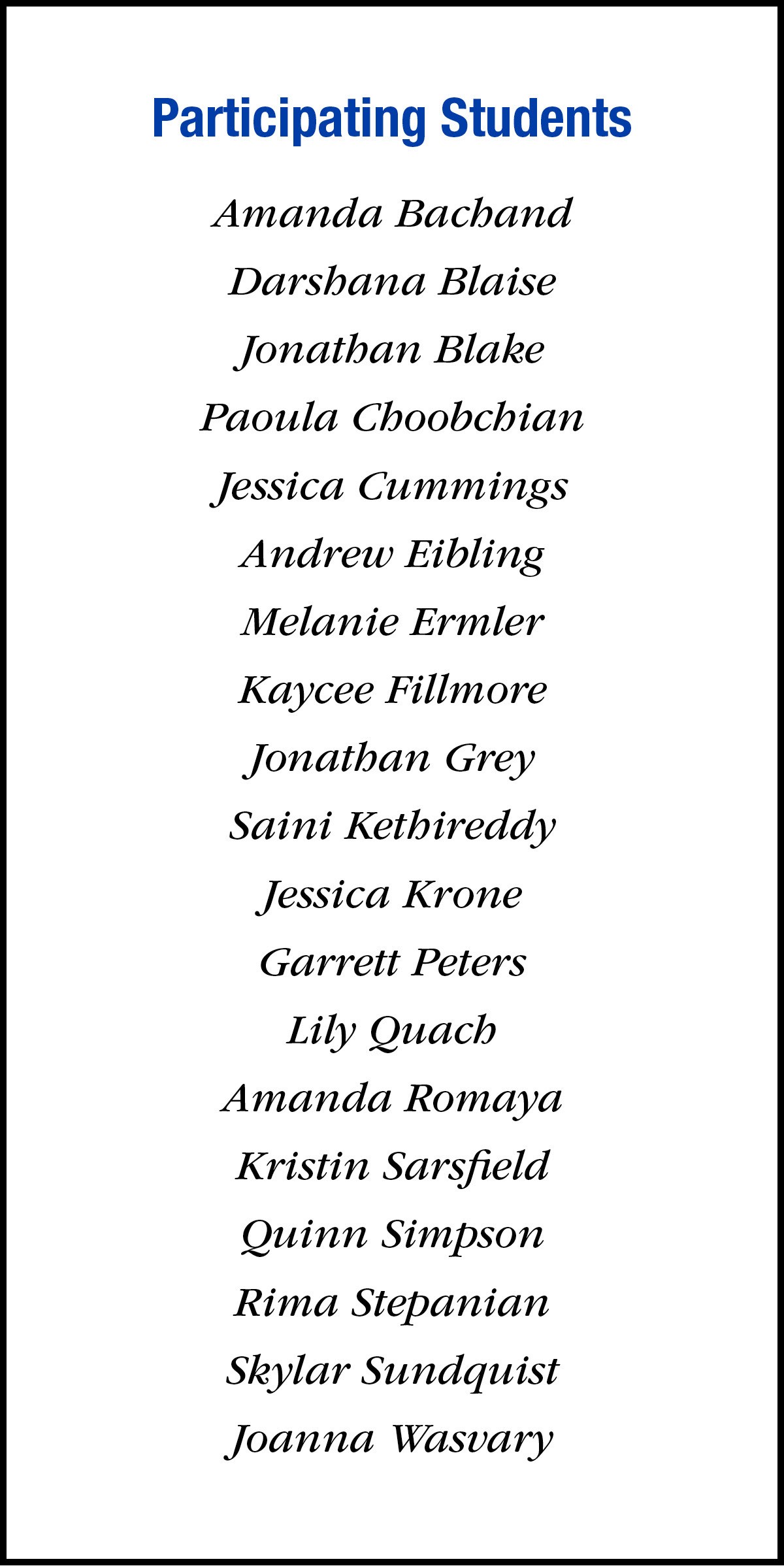
To gain better understanding and appreciation of where she’s come from — as well as where she is going —Jessica Krone is about to travel 4,500 miles from Michigan.
The OUWB medical student’s destination? Poland.
It has nothing to do with summer vacation, though, nor touring the region’s storied castles, markets, etc.
Instead, Krone will visit central Europe as one of 20 OUWB medical students participating in the school’s Holocaust and Medicine program — a first-of-its-kind learning opportunity for a U.S.-based medical school. (See complete list of participating students in box.)
Krone, who grew up in Canton, Michigan, and earned her undergraduate degree from Oakland University, says her Jewish heritage and her future as a physician compelled her to seek out the opportunity.
“This trip is exactly what I’ve always wanted to do — learn more about the Holocaust and the ethics involved,” she says.
“It fits right in with my passion for medicine, so when I saw this opportunity, it just felt like a calling for me to go.”
Designed to be a meaningful and transformative educational experience, the group will delve into the distinctive and tragic era in the history of medicine. Students will critically reflect on the implications of that history as they visit sites in the region, including Auschwitz-Birkenau.
Upon their return, participants will take part in a seven-week seminar as part of OUWB’s Medical Humanities and Clinical Bioethics 3 course.
Students like Krone are preparing for a once-in-a-lifetime kind of experience.
“I’m looking forward to a lot of personal reflection while recognizing the severity of what went on…being able to put myself in that place and see where these people walked,” says Krone. “I also plan to reflect on the position I’m in and use it as a calling to be a pioneer for the future.”
Preparing for the trip
 The OUWB Study Trip to Auschwitz was announced last September.
The OUWB Study Trip to Auschwitz was announced last September.
It is scheduled to consist of a seven-day trip to Poland, with guided tours of places such as Auschwitz-Birkenau, special lectures, and interactive workshops.
During the seven-week seminar to follow the trip, students will discuss and reflect upon the experience, the relevance of this history to contemporary medicine, and develop projects to disseminate what they learned to community groups, as well as at OUWB, OU, and beyond.
Program co-directors are Jason Wasserman, Ph.D., associate professor, Department of Foundational Medical Studies, and Hedy Wald, Ph.D., clinical professor of Family Medicine at Alpert Medical School of Brown University, and faculty member at Harvard Medical School Global Pediatrics Leadership Program.
They will be in Poland leading the group along with Duane Mezwa, M.D., Stephan Sharf Dean, OUWB.
Funding for the trip comes almost entirely from donors, including the Bella Rozencweig Hirsch Endowment for Biomedical Ethics.
When first announced, program application was open to all first-year medical students in good academic standing. Applicants had to write three essays. The 20 students selected were notified in late February.
Since then, participating students have prepared via several modules designed by Wasserman and Wald. They also toured The Zekelman Holocaust Center in Farmington Hills, and attended a special dinner with the donors who have made it all possible.
Each student has different reasons for wanting to be part of the learning opportunity.
One of the ‘greatest opportunities’
Paoula Choobchian emigrated to the U.S. from Iran in 2010. She grew up in California and earned an undergraduate degree from University of California – Irvine. She “fell in love” with OUWB when she learned what the school was all about.
Choobchian plans to specialize in correctional medicine.
When she found out she would be part of the Holocaust and Medicine program, Choobchian says she “was very excited” and texted all of her family and friends.
She says she expects to use the opportunity to reflect deeply on the segregation and discrimination she faced growing up as well as the responsibilities she will one day face as a physician.
“This is one of the greatest opportunities I’ve had in my life,” says Choobchian. “I want to be exposed to what the history is all about, in part so that the same mistakes don’t happen, at least on my end. “
Choobchian says she is preparing for a “heavy” journey.
“Right now, we have all of the pre-trip excitement,” she says. “But we’re going to concentration camps…I can be emotional and I know it’s going to be heavy.”
Darshana Blaise grew up in Sharon, Massachusetts, and earned an undergraduate degree from University of Massachusetts - Amherst.
Blaise knew she wanted to be a doctor from the age of about 8, when she visited family members in the hospital and witnessed “how caring the doctors were and how patiently they worked with the families involved.”
She says OUWB was a good fit for her because she “wanted to find a medical school that was very big on service, very big on being patient-centered” and that she appreciated the school’s diverse faculty.
When Blaise found out she would be travelling to Poland as part of the Holocaust and Medicine program, she says she was “all smiles” and felt “very, very grateful.”
“Every single experience that I’ve had in life has been an opportunity for learning and an opportunity for growth,” she says. “This is going to be a very good experience in regards to growth.”
Blaise says she has given a lot of thought to how it will help her be a better doctor.
“It’ll make me a better doctor by pushing me to always be more aware of the life experiences of others,” she says. “We’re not all open books…there are a lot of histories, traumas, experiences, and cultures that we all carry.”
She credits OUWB officials for breaking new ground with the program.
“It’s an important thing for OUWB to stand as an example for other medical schools, colleges, and primary and secondary education to better incorporate Holocaust education into the student curriculum,” she says. “Not just for antisemitism, but to encourage teaching in programs that support a better understanding of how to be an active fighter against racism…against xenophobia and homophobia.”
She adds that learning about the Holocaust can shed light on “why many of these issues are prevalent in our societies, even if we’re not aware of it.”
For more information, contact Andrew Dietderich, marketing writer, OUWB, at [email protected].
To request an interview, visit the OUWB Communications & Marketing webpage.
NOTICE: Except where otherwise noted, all articles are published under a Creative Commons Attribution 3.0 license. You are free to copy, distribute, adapt, transmit, or make commercial use of this work as long as you attribute Oakland University William Beaumont School of Medicine as the original creator and include a link to this article.

